Hoe gedragen toezichthouders zich onder druk?
Door Thomas Schillemans & Marija Aleksovska, 21 juli 2020
Een oordeel vormen – het is dagelijkse kost voor toezichthouders. Maar hoe zorgvuldig doen zij dit als er conflicterende verwachtingen zijn rondom hun besluit? Dat onderzochten Thomas Schillemans en Marija Aleksovska, in samenwerking met de Inspectieraad, de Nederlandse School voor Openbaar Bestuur (NSOB) en de Inspectie Gezondheidszorg en Jeugd (IGJ). De conclusies zijn hoopgevend: ondanks de druk werken toezichthouders secuur, snel en strategisch en nemen daarmee hun verantwoordelijkheid.
Klik hier voor het hele artikel
————————————————————–
A Validated Measurement for Felt Relational Accountability in the Public Sector
By Sjors Overman, Thomas Schillemans & Stephan Grimmelikhuijsen, May 2020
The effectiveness of formal public sector accountability mechanisms is largely predicated on the individual perception of accountability. In particular, the individual’s experienced relationship to account holders is key in understanding the effects of formal accountability mechanisms. This article develops a measurement instrument for felt relational accountability in public administration.

Click here to read the article
‘You Can’t Always Get What You Want’: The effects of winning and losing in a referendum on citizens’ referendum support
By Lars Brummel, June 2020
In Western democracies, many citizens support the use of referendums. However, as referendums create satisfying outcomes for citizens with majority views, they could generate ambivalent feelings among voters for the minority option. Little is known about the effects of winning or losing a referendum for citizens’ referendum support. This article analyses multiple-wave survey data from five referendums in Bavaria (Germany), Finland and the Netherlands.
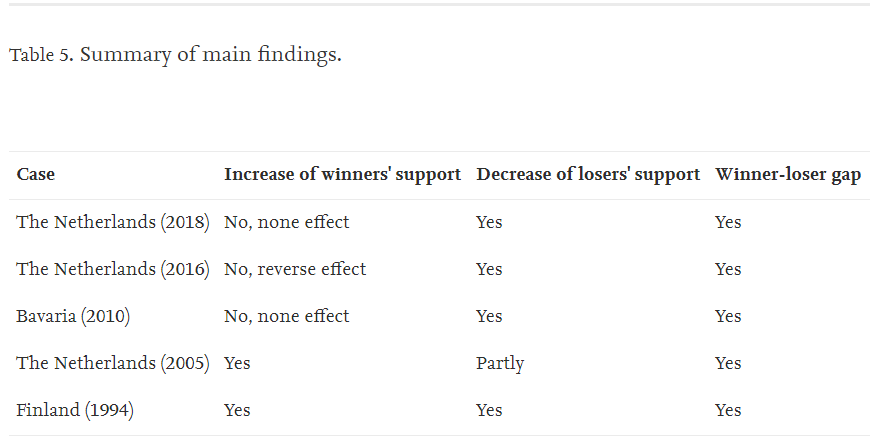
Click here for the article
Gevolgen van de meetbare politie: Verantwoording voelen en ervaring
Door Sjors Overman & Thomas Schillemans, april 2020
In een bijdrage aan het Tijdschrift voor de Politie schrijven Sjors Overman en Thomas Schillemans dat de druk op meetbaarheid directe effecten heeft op de werkbeleving van individuele agenten. Ze laten ook zien hoe het gevoel van verantwoording een onmisbare schakel is in het debat hierover.
Klik hier voor het artikel
A Multidimensional Reputation Barometer for Public Agencies: A Validated Instrument
By Sjors Overman, 18 February 2020
Reputation is of growing interest for the study of public bureaucracies, but a measurement that can discern between the subdimensions of reputation and is validated on real-life audiences has remained elusive. The authors deductively build, test, and cross-validate a survey instrument through two surveys of 2,100 key stakeholders of the European Chemicals Agency, the European Union chemicals regulator. This empirical tool measures an agency’s reputation and its building blocks.
Click here for the article
Aligning accountability arrangements for ambiguous goals: The case of museums
By Sjors Overman, 3 February 2020
In a simple model of accountability, the core of the interaction consists of the supply and demand of performance information. Alignment of information supply and demand is crucial for an effective accountability relationship, but alignment is difficult in a situation with ambiguous or contested goals. This study analyzes the alignment between local governments and museums. The study uses a mixed-methods approach, including survey data, formal documents, and qualitative interviews with museum directors to analyse the accountability alignment.
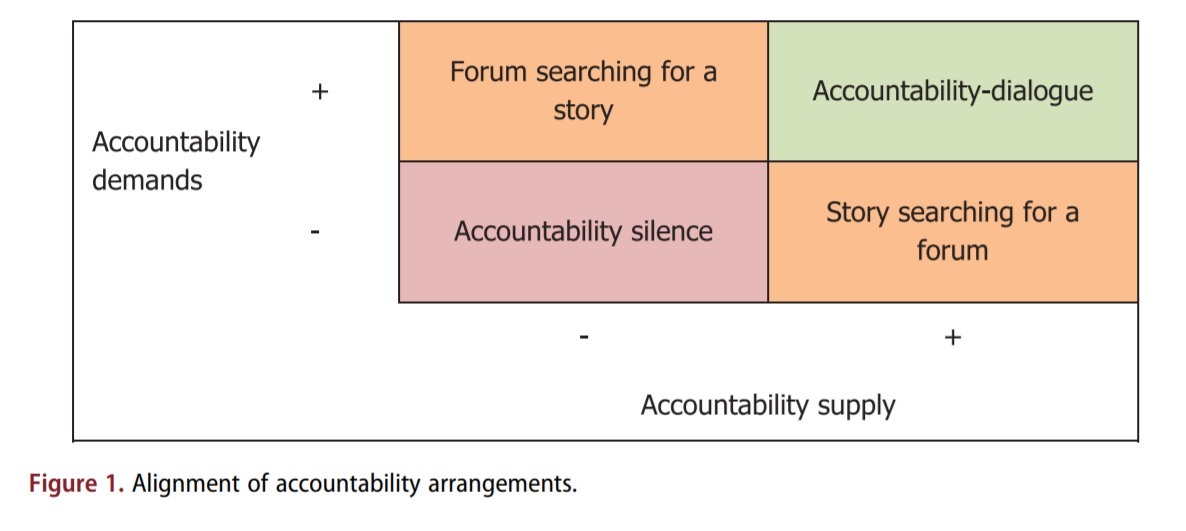
Click here for the article
De kwaliteit van (juridische) oordelen
Door Thomas Schillemans & Ivo Giesen, 22 januari 2020
In het Nederlands Juristenblad doen Thomas Schillemans en Ivo Giesen verslag van drie verkennende experimenten naar de kwaliteit van beoordelingen door professionele beoordelaars in de publieke sector. De inzet daarvan is om te leren van de gedragswetenschappen in onderzoek naar kwaliteit en effectiviteit van professioneel oordelen.
Klik hier voor het hele artikel
Lessons from five decades of experimental and behavioral research on accountability: A systematic literature review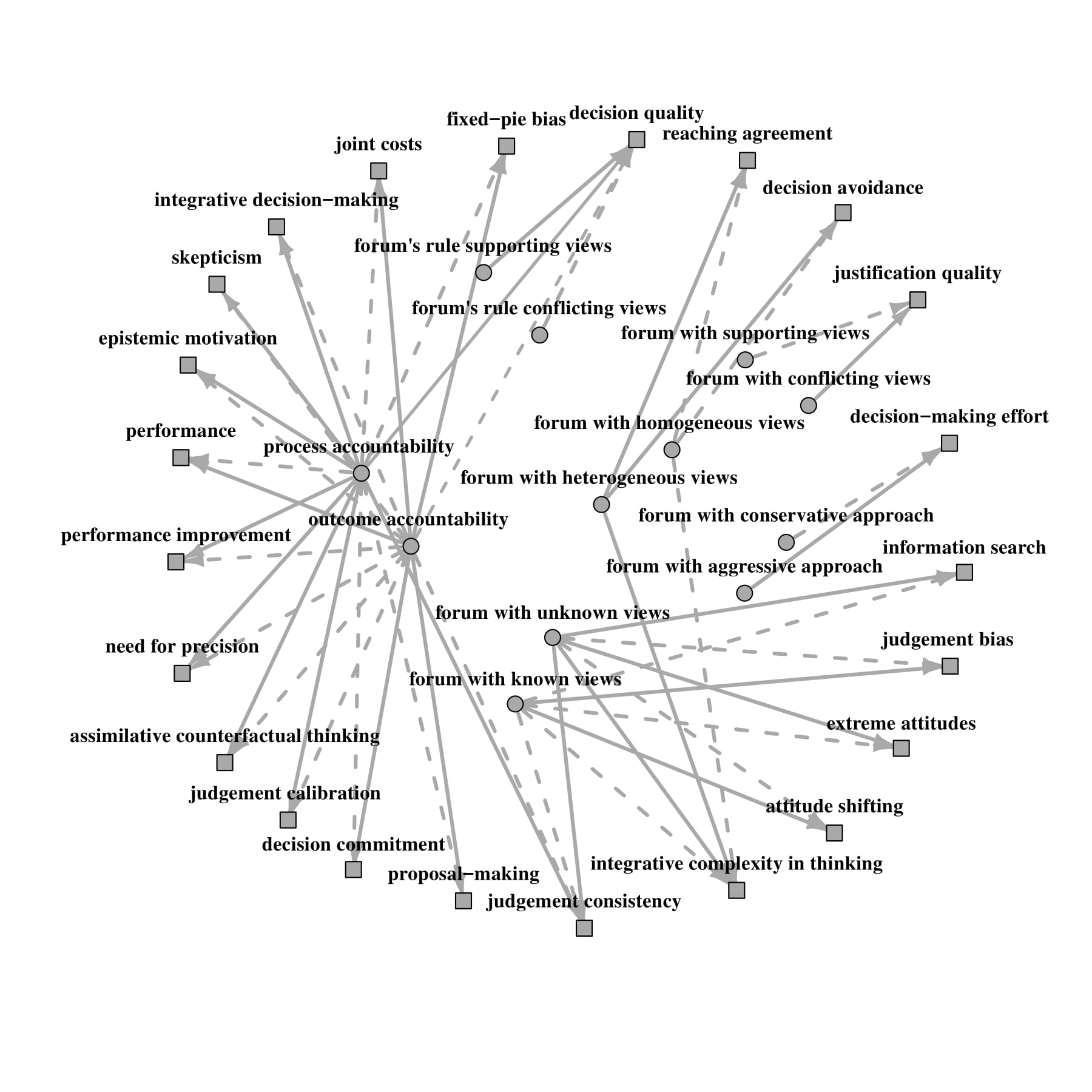
By Marija Aleksovska, Thomas Schillemans & Stephan Grimmelikhuijsen, 29 July 2019
In this new publication Aleksovska et al. synthesize the empirical evidence on the effects of accountability mechanisms investigated in 266 experiments in the behavioral sciences – almost half a century of research. This interdisciplinary and comprehensive systematic literature review provides an extensive analysis of experimental insights by analyzing four underlying themes in the literature – the effects of accountability on decision making, behavior and outcomes; and effects of specific characteristics of accountability mechanisms.
Click here for the article
Words count
By Thomas Schillemans & Marija Aleksovska, November 2019
A linguistic analysis of the possible impact of the European Court of Auditors’ special reports. The results were presented to the European Court of Auditors on 19 November.
Click here for the report
Maatwerk, discretionaire ruimte en oordeelsvorming
Door Thomas Schillemans & Marija Aleksovska, november 2019
Een onderzoeksrapport van een survey en realistisch experiment bij vier uitvoeringsorganisaties.

Klik hier voor het rapport
Met vertrouwen verantwoorden
Door Cor van Montfort & Meike Bokhorst, 12 februari 2019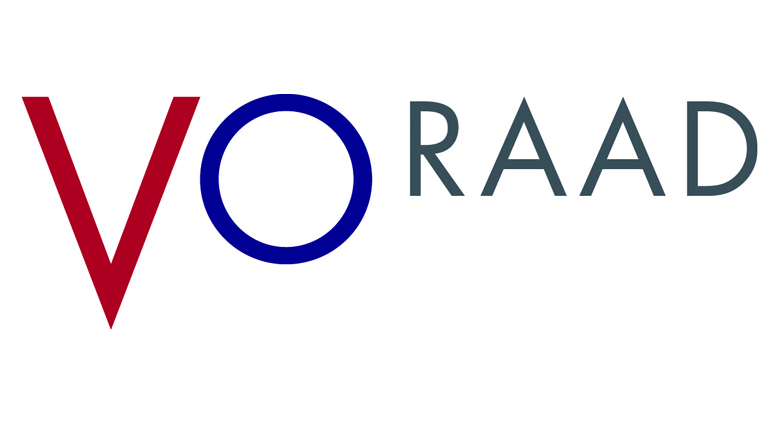
Dit is een eindverslag van een onderzoek naar de mogelijkheden om de verantwoording in de sector Voortgezet Onderwijs te verbeteren. Het onderzoek is uitgevoerd in opdracht van de VO-raad.
Klik hier voor het verslag
Van toezicht op kwaliteit naar toezicht op bestuur
Door Meike Bokhorst, Marieke van Genugten, Mirjan Oude Vrielink & Thomas Schillemans, December 2018
In semipublieke sectoren van onderwijs, zorg en wonen is er een trend naar meer bestuursgericht toezicht. De aandacht verschuift van inhoudelijk toezicht op minimumkwaliteitseisen naar randvoorwaardelijk toezicht op bestuurlijke kwaliteitszorg. Het doel van dit themanummer is inzicht te krijgen in hoe kansrijk of risicovol deze vorm van toezicht is.
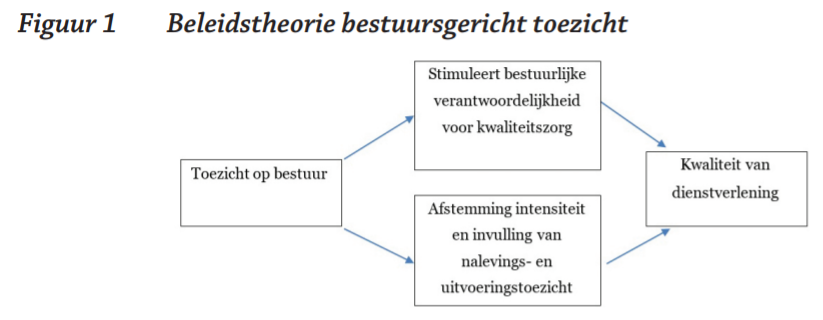
Klik hier voor het artikel
Voorlopige contouren van bestuursgericht toezicht
Door Thomas Schillemans, Meike Bokhorst, Marieke van Genugten & Mirjan Oude Vrielink, December 2018
De toezichthouders in onderwijs, zorg en wonen richten zich de laatste jaren
steeds nadrukkelijker ook op het bestuur van instellingen. In dit artikel worden empirische inzichten besproken uit de jonge praktijk van bestuursgericht toezicht.
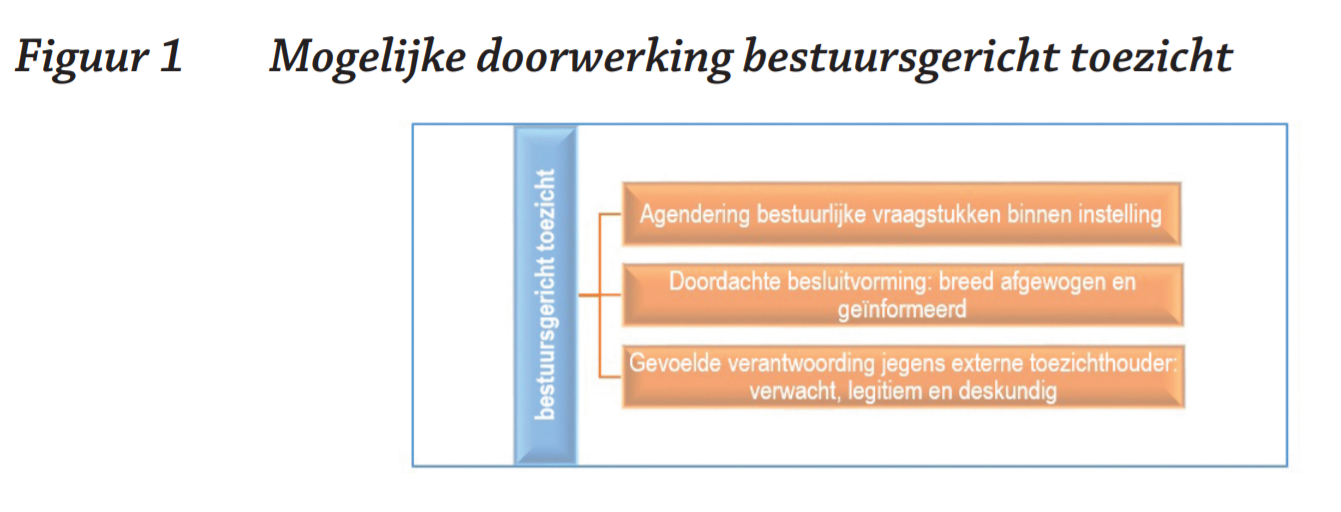
Klik hier voor het artikel
Aangescherpt bestuursgericht toezicht in de corporatiesector
Door Olga Verschuren & Stefanie Beyens, December 2018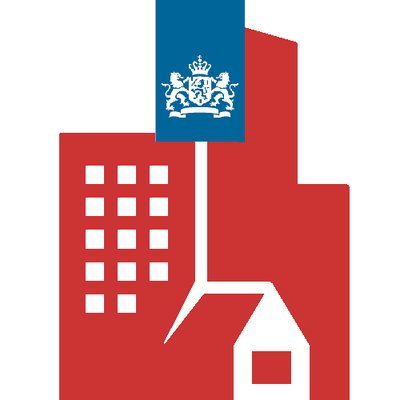
Een reeks ontsporingen in de corporatiesector zorgde in 2015 voor een koerswijziging richting aangescherpt ‘bestuursgericht’ toezicht. Een onafhankelijke Autoriteit woningcorporaties (Aw) houdt daarom zowel de bestuurders en commissarissen als de organisatiebesturing en de interne checks-and-balances scherp(er) in beeld. Het wakende oog van de Autoriteit woningcorporaties wordt in dit artikel onder de loep genomen.
Klik hier voor het artikel
Reflecties op de staat van het toezicht
 Door Thomas Schillemans & Meike Bokhorst, 3 juli 2019
Door Thomas Schillemans & Meike Bokhorst, 3 juli 2019
In de bundel ‘Reflecties op de staat van het toezicht’ van de Inspectieraad laten twaalf experts hun licht schijnen op de huidige stand van zaken. Thomas Schillemans droeg bij aan deze bundel met het hoofdstuk ‘Van naleven naar nadenken: Gedragswetenschappelijke inzichten voor de maatschappelijke functie van toezicht’. Meike Bokhorst schreef het hoofdstuk ‘Omgevingsgericht toezicht op de semipublieke bestuurspraktijk’.
Klik hier voor het rapport
The Unknown World of Transnational Organizations in Europe: Challenges for Accountability
By Thomas Schillemans & Gijs Kremers, 3 October 2019
Mostly unknown to the general public, a fragmented landscape of transnational organizations has been developing in Europe. These organizations work across borders, but not entirely in the EU, and they generally have some basis in European law or policies. An inventory by the authors suggests there are at least 370 transnational organizations in Europe. Transnational organizations challenge basic notions of accountability: it is often very difficult to understand what the organization is doing, to whom it is accountable or even where it is located. This is not to say that accountability is necessarily a problem but much more research and insight is definitely required.
Click here for the article
Click here for the database
Verantwoording bij Gemeentemusea: Van beoordelingsritueel naar functionele evaluatie
Door Sjors Overman & Olga Verschuren, januari 2018

Musea hebben een centrale functie in het publieke domein. Museumdirecties zijn zich daar goed van bewust en het besef van de wenselijkheid van publieke verantwoording in breed gedragen binnen de sector. In de verantwoordingsrelatie tussen musea en gemeentes blijft het echter een lastige opgave om geschikte indicatoren voor prestaties te vinden die aansluiten bij de ambities van zowel musea als gemeente. Gevolg hiervan is dat de vraag waarover musea verantwoording moeten afleggen lastig te beantwoorden blijft. In dit onderzoek wordt gesignaleerd dat museumdirecteuren nu vaak ervaren dat verantwoording op sommige, vooral financiële gebieden, aan te veel eisen moet voldoen, waardoor het een ge-voel van regeldruk oplevert. Tegelijkertijd wordt gesignaleerd dat directeuren in hun verantwoordingsrelatie soms juist te weinig ruimte voelen voor het inhoudelijke verhaal dat zij wilden ver-tellen. De afstemming tussen verhaal en beoordelaar is daarom belangrijk.
Klik hier voor informatie over het onderzoek
Calibrating Public Sector Governance: A survey of arm’s-length agencies in the Australian Commonwealth Public Sector
By Amanda Smullen, Paul Fawcett & Thomas Schillemans, 27 September 2018
 This report presents the Australian findings from the Calibrating Public Sector Governance (CPSG) survey. The study is timely given the Government announcement of an independent review of the Australian Public Service. The CPSG survey is an international collaboration between leading researchers in the fields of public administration and accountability from different Western countries (Australia, Denmark, Norway, the Netherlands, Sweden, Switzerland and the United Kingdom). Australia’s participation is led by Dr Amanda Smullen at the Crawford School of Public Policy, The Australian National University, and Associate Professor Paul Fawcett at the Institute for Governance and Policy Analysis, University of Canberra. The international project is led by Professor Thomas Schillemans at the School of Governance, Utrecht University, and has been funded by a NWO-VIDI grant (Dutch Research Council).
This report presents the Australian findings from the Calibrating Public Sector Governance (CPSG) survey. The study is timely given the Government announcement of an independent review of the Australian Public Service. The CPSG survey is an international collaboration between leading researchers in the fields of public administration and accountability from different Western countries (Australia, Denmark, Norway, the Netherlands, Sweden, Switzerland and the United Kingdom). Australia’s participation is led by Dr Amanda Smullen at the Crawford School of Public Policy, The Australian National University, and Associate Professor Paul Fawcett at the Institute for Governance and Policy Analysis, University of Canberra. The international project is led by Professor Thomas Schillemans at the School of Governance, Utrecht University, and has been funded by a NWO-VIDI grant (Dutch Research Council).
The CPSG survey examines the public management, governance and accountability of public sector agencies in the Commonwealth Public Sector. For the purposes of this comparative research project, Australian public sector agencies are defined as distinct from portfolio departments, though they can also sometimes be located as separate organizational identities and units within departments. On this basis, we surveyed Corporate Commonwealth Entities (CCE) and Non‑Corporate Commonwealth Entities (NCE) as defined by the Public Governance, Performance and Accountability Act 2013 (the PGPA Act). These agencies often have semi-autonomous status and operate at “arm’s-length” both within or from portfolio departments. Public sector agencies typically vary in their degree and type of formal autonomy—from financial autonomy through to distinct statutory responsibilities. Internationally, more than 1000 top‑level managers of agencies responded to the CPSG survey.
Click here for the survey
Comparing Governance, Agencies and Accountability in Seven Countries | CPA Initial Survey Report
By Sjors Overman, Thomas Schillemans & International colleagues, 24 March 2018
This report provides an overview of initial findings and some first analyses. It serves as a first peek at some of the most important findings. Further analyses and reflections will be published in time.
The survey aimed t o analyze external accountability and its impact on decision makers in public sector agencies, by mapping the formal accountability regimes of the organizations, real accountability practices and individually felt accountability. The focus is on accountability for policy and results; not on financial or legal accountability and decision-making; and is focused on the top managers in agencies. The survey intends to innovate public administration research on public sector accountability.
o analyze external accountability and its impact on decision makers in public sector agencies, by mapping the formal accountability regimes of the organizations, real accountability practices and individually felt accountability. The focus is on accountability for policy and results; not on financial or legal accountability and decision-making; and is focused on the top managers in agencies. The survey intends to innovate public administration research on public sector accountability.
Click here to see what has been found so far
Nobel prize for behavioral economist Richard Thaler
By Thomas Schillemans & Barbara Vis, 20 October 2017
A nudge in the right direction for research in public policy and administration.

Click here to read the article (NL)
Woorden tellen. Linguïstische analyse visitatierapporten woningcorporaties Nederland 2015
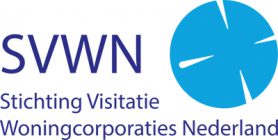 Door Thomas Schillemans, Marija Aleksovska & Rixt Riemersma, 9 december 2015
Door Thomas Schillemans, Marija Aleksovska & Rixt Riemersma, 9 december 2015
Dit onderzoek betreft een linguïstische analyse van visitatierapporten van verschillende woningcorporaties. Het doel van het onderzoek is te verkennen welke kenmerken dit type verantwoordingsdocumenten heeft. Dit onderzoek is uitgevoerd in overleg met de Stichting Visitatie Woningcorporaties Nederland.
Klik hier voor het onderzoek
Calibrating Public Sector Accountability. Translating Experimental Findings to Public Sector Accountability
By Thomas Schillemans, 8 December 2015

Accountability mechanisms are among the most important means with which governments guard and improve the performance of public sector organizations. However, research documents a plethora of accountability-failures. A key issue is: how can public sector accountability become more effective? This paper seeks to answer this question by connecting two largely separated strands of research: public administration research on real-world organizations and experimental research on the effects of different forms of accountability on decision-making. The paper develops the Calibrated Public Accountability model (CPA-model) from experimental research findings which can be used to investigate how accountability can be calibrated to task requirements of organizations.
Click here for the paper

